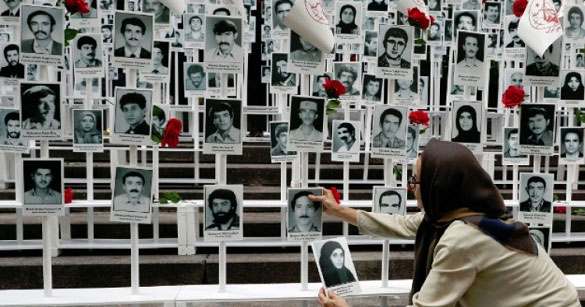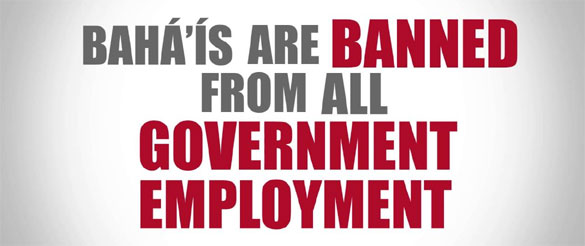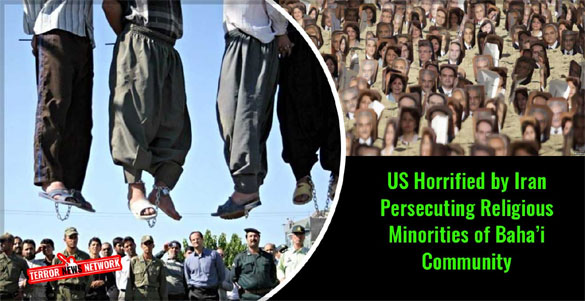Persecution Of Bahais In Iran: Bahais Of India Issued A Statement Appealing To The Government Of Iran To End Persecution Of Bahais In The Country
New
Age Islam Special Correspondent
16 February
2021

Persecution of members from the Baha’i Faith community in the Islamic
Republic of Iran
-----
In February
this year, the Bahais of India issued a joint appeal to the Iranian government
authorities to end the persecution of the Bahais of Iran, particularly of Ivel village
and return their land and properties.
An excerpt
from the appeal says:
“We are
saddened to note the series of incidents regarding the destruction of
properties and mass displacement of the Baha’is of Ivel village in Mazandaran
Province in Iran. Baha’is of this
village have been facing persecution since 1983. In 2010, the Baha’i homes in
this village were subjected to arson and demolition which resulted in repeated
grievances and complaints by the Baha’is at local and national levels.
In
November, 2020 government agents raided twenty homes and shops of Baha’is in
coordinated raids across the country, demanding that they hand over their
property deeds.
We are
greatly concerned by the Iranian court’s decision to confiscate the properties
of 27 Baha’is of Ivel and distribute them to local Muslim residents in the
village. This judgment is not in conformity with the Sharia law to take
properties from one group for their faith and hand it over to Muslims. To
disrespect another religion is explicitly condemned in our Holy Quran.”
The appeal
has brought to fore the persecution, torture and social ostracisation of the
Bahai community of Iran by the government of Iran. The Bahai community claims
that they have been going through persecution and social ostracisation in Iran since
the mid-19th century. After the Islamic Revolution in 1979, the persecution
became state sponsored and systematic. They are often driven out of their
homes, their religious properties and individual lands are confiscated and
their cemeteries and shrines are damaged and destroyed by the government and
the people of the majority community.
The Bahais
claim the persecution of the Bahais of Iran is
a part of the government policy adopted during the life of Ayatollah
Khamenei. The official memorandum of the government of Iran obtained by the UN
in 1993 says:
“The
government’s dealings with the Bahais must be in such a way that their progress
and development are blocked.” Former UN rapporteur Heiner Bielefeldt
said," Iranian Bahais experience persecution from the cradle to the grave,
and beyond."

In August
1980, 9 members of Bahai administrative institution were abducted and were
taken to an unknown location. They were feared executed extra judicially.
In
pursuance of the government policy, In August 1983, Iranian Attorney General
announced a legal ban on Bahai religious activities. In the aftermath of the
ban, the National Spiritual Assembly of Bahais was voluntarily dissolved. After
the ban. Bahai cemeteries, holy places and properties were seized, confiscated
and destroyed by the government.
After the
ban, the Bahais constituted a committee called Yaaran (friends) to
attend to the social and spiritual needs of the Bahais with government
permission. But in 2008, 7 members of the committee were arrested and sentenced
to 20 years of imprisonment. The punishment was later reduced to ten years.
The Bahais
of Ivel, a town with a sizeable population of Bahais are the main target of
government sponsored persecution.
Ivel is
situated in Chahardangeh of Hezarjarib in Mazandaran Province in Iran. The
Bahá’í community was established in Ivel around 160 years ago and by the late
1800s, half of the population of Ivel were identified as Bahá’ís.
From its
inception, the Bahá’í community participated in social, economic and cultural
developments, including the construction of schools and bath houses, and
assistance to war and earthquake victims.
Similar to
other rural communities with a Bahá’í populace, Ivel too has had its own share
of persecutions, suffering, and oppression from its inception and throughout
the years. On 25 November 1941, the head of the village council, Mirza Agha Jan
Jazbani, a Bahá’í who was well respected by the villagers, and even the nearby
districts, was killed for his beliefs.
The Bahais
allege that since the Islamic Revolution, the persecutions systematically
continued. The widespread attack on 28 June 1983 led to the expulsion and
displacement of the Bahá’ís of Ivel. They say that the clergy and the local
authorities incited the Muslim crowd in the village and nearby communities to
bring the Bahá’ís out of their homes, direct them into a bus that was prepared
outside the village, transport them to Sari, and drop them off there. However,
when the bus arrived at the city of Sari, the authorities protested and
strictly opposed such a plan, only to make the bus return the Bahá’ís to Ivel.
But upon their return the village did not allow the Bahá’ís to return to their
homes; instead, they were imprisoned inside the local mosque. More than 130 of
them―including children and the elderly―were held captive for three days
without food and water. When pressure to make them recant their faith failed,
they were allowed to return home. However, that same night, they were attacked
by villagers. A few were taken off by the mob, others were injured, and more
were forced to hide in a nearby forest.
The Bahá’ís
who managed to keep their ancestral homes in Ivel, and some of whom had a piece
of land for farming in order to make a living would go there every summer and
stay in their homes temporarily to farm. Even under these circumstances, the
authorities would not hesitate to try and take their homes and farms away from
them. Their plan was for the Bahá’ís to never return to Ivel so that their
lands could be taken over.

On 23 June
2010, some individuals demolished and flattened approximately 50 Bahá’íhouses
in Ivel with four bulldozers and a number of trucks.
Since 1983,
the Bahá’ís in Ivel have tried to appeal for their rights in writing and in
person to all the government institutions, the leader of the parliament, the
judicial system, etc. These appeals still continue.
The policy
of the government of Iran towards the Bahais of the country is entirely
inspired by the Sunni government of Egypt where they face similar degree of
persecution. In 1960, Gamal Abdel Nasser decreed a law that declared the Bahai
community of Egypt an independent religion not recognized by the state. After
the law came into effect, the cemeteries, shrines and other religious
properties were either destroyed or confiscated by the government. The lands of
individual Bahais were also confiscated. Since then, the Egyptian government
has continued to pursue its policy adopted by Gamal Abdel Nasser in the 60s.The
government officially recognizes only Islam, Christianity and Judaism for
official purposes. The Al Azhar has issued a fatwa declaring Bahais as Kafirs
(apostates). Therefore, the Bahais of Egypt cannot profess their religion
freely and have to hide their identity as Bahais. They cannot obtain voter
cards, birth certificates and other government identity cards as Bahais.
Following
the policy of Egypt towards the Bahais, other Islamic countries like Burundi,
Congo, Uganda, Niger, Afghanistan, Azerbaijan, Mali and Morocco also banned the
religion. In these countries, the Bahais face varied degree of ostracisation
and persecution both from the government and the common people.
Today the
Bahais of Iran live in constant fear of being attacked, abducted and displaced
both by the government and the majority population. Most of the time, the local
clerics incite the violence against them calling them Kafirs.
The world
community should raise its voice against the persecution of Bahais in Iran and
in other Islamic countries and ensure them a life of dignity within the frame
work of international laws.
URL: https://newageislam.com/islam-sectarianism/persecution-bahais-iran-bahais-india/d/124317
New Age Islam, Islam Online, Islamic Website, African Muslim News, Arab World News, South Asia News, Indian Muslim News, World Muslim News, Women in Islam, Islamic Feminism, Arab Women, Women In Arab, Islamophobia in America, Muslim Women in West, Islam Women and Feminism